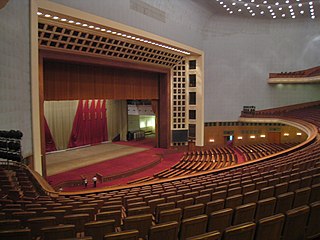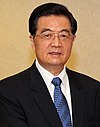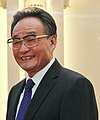The session
The National People's Congress is the People's Republic of China's highest legislative body. The congress is composed of members from the Chinese People's Political Consultative Conference, a coalition of nine parties. In practice the final vote on legislation is nearly always close to unanimous, and legislative practice has been to achieve consensus before the final vote including the approval of senior officials of the Chinese Communist Party and the State Council of the People's Republic of China.
Because of this practice, controversial items can be removed from the NPC agenda if there is serious disagreement over the contents of the legislation. This occurred this session with the Property Law of the People's Republic of China which was originally scheduled for approval this year but was dropped after objections from the Leftist party members who argued that the draft did not sufficiently protect state assets.
Formal issues listed for discussion include the "Three Rural Issues" from agricultural reform, cracking down on corruption, and studying the Three Represents as the guide for Chinese policy in the days ahead. Formally, Premier Wen Jiabao made the annual government report to the Congress outlining government policy and its progress from 2005. The Eleventh Five-Year Plan will undergo review. A Budget will be drafted for the following fiscal year. NPC Standing Committee Chairman Wu Bangguo will review the work of the NPC Standing Committee from last year. The Judiciary system will also make its respective reports.
In official Chinese news, the phrase "core of leadership" has been omitted when describing Hu Jintao. This came in stark contrast to the repetitive "unify under the core of leadership under Jiang Zemin" slogan used frequently in China during his years in power. Vice-Premier Huang Ju was absent because of health problems.
Wen Jiabao's government report
Premier Wen Jiabao delivered the PRC government's 2006 Working Report on the morning of March 5 at the Great Hall of the People. It was nationally televised on four CCTV channels and other networks. The report was around two hours in length. The three sections of the report outlined the government's workings in 2005, the direction the government was planning for the new year, and a brief outline of China's 11th Five-Year Plan. Agriculture and the "Three Rural Issues" policy was emphasized throughout the speech, as was the concept of "Governing for the People" (执政为民). Wen heavily emphasized helping the poor and relieving the wealth gap. Wen announced that agricultural taxes levied regularly on peasants would be fully abolished in 2007. On the issue of health, Wen stressed the need to prevent an avian influenza-related epidemic, and warned people to be cautious of the outbreak and exercise common sense.
Many Chinese political analysts concluded that the report was thorough, detailed, thoughtful, and reached out to the people. Western media outlets were mostly neutral on the issue. It was considered to have contained fewer political overtones than in previous years. Although Wen's speech was met with frequent applause, the longest applause came during Wen's mention of the firm stance against Taiwan independence. Wen favoured peaceful re-unification, but stated that the Chinese government will not back down should Taiwanese authorities go "too far", as has been his position for the previous two years.
Issues discussed
Science and technology was a main issue talking point, and there was consensus that China should continue to move forward with their development. Many deputies have shown concern about the urban-rural wealth gap. Critics say women's rights issues have been ignored, noting that the marital rape bill was shot down. New legislation was passed to prevent disabled persons from being discriminated against in education.
Noticeably, the Anti-Secession Law was not mentioned any time during the Sessions, as China wishes to present a more friendly image to the Taiwanese people, in order to promote a peaceful reunification.

Wen Jiabao is a Chinese retired politician who served as the premier of China from 2003 to 2013. In his capacity as head of government, Wen was regarded as the leading figure behind China's economic policy. From 2002 to 2012, he held membership in the Politburo Standing Committee of the Chinese Communist Party, the country's de facto top power organ, where he was ranked third out of nine members and after general secretary Hu Jintao and Wu Bangguo, chairman of the Standing Committee of the National People's Congress.

The Standing Committee of the National People's Congress (NPCSC) is the permanent body of the National People's Congress (NPC), the national legislature of the People's Republic of China. It exercises the powers of the NPC when it is not in session.

Wu Bangguo was a Chinese politician who served as the second-ranking member of the Politburo Standing Committee of the Chinese Communist Party from 2002 to 2012, and as Chairman of the Standing Committee of the National People's Congress from 2003 to 2013.
The Shanghai clique, also referred to as the Shanghai gang, Jiang clique, or Jiang faction, refers to an informal group of Chinese Communist Party (CCP) officials who rose to prominence under former CCP General Secretary Jiang Zemin while he served as the party chief and mayor of Shanghai.

The 16th National Congress of the Chinese Communist Party was held in Beijing between November 8 and 14, 2002. It was preceded by the 15th National Congress and was succeeded by the 17th National Congress. 2,114 delegates and 40 specially invited delegates represented the party's estimated 66 million members.

In the People's Republic of China, Deng Xiaoping formally retired after the 1989 Tiananmen Square protests and massacre, to be succeeded by former Shanghai CCP secretary Jiang Zemin. During that period, the crackdown of the protests in 1989 led to great woes in China's reputation globally, and sanctions resulted. The situation, however, would eventually stabilize. Deng's idea of checks and balances in the political system also saw its demise with Jiang consolidating power in the party, state and military. The 1990s saw healthy economic development, but the closing of state-owned enterprises and increasing levels of corruption and unemployment, along with environmental challenges continued to plague China, as the country saw the rise to consumerism, crime, and new-age spiritual-religious movements such as Falun Gong. The 1990s also saw the peaceful handover of Hong Kong and Macau to Chinese control under the formula of One Country, Two Systems. China also saw a new surge of nationalism when facing crises abroad.

The Anti-Secession Law is a law of the People's Republic of China, passed by the 3rd Session of the 10th National People's Congress. It was ratified on March 14, 2005, and went into effect immediately. President Hu Jintao promulgated the law with Presidential Decree No. 34. Although the law, at ten articles, is relatively short, Article 8 formalized the long-standing policy of the PRC to use military means against Taiwan independence in the event peaceful means become otherwise impossible. The law does not explicitly equate "China" with the People's Republic of China.
The proposed National Unification Promotion Law of the People's Republic of China is a document that appeared in early 2004 as a suggestion to create formal a legal basis for the People's Republic of China's unification with Taiwan. It was authored by a Chinese scholar Yu Yuanzhou (余元州), a professor from the Jianghan University in Wuhan who does not have a formal governmental position. Although no formal legislative action has been taken on the document, it was widely discussed in China. The reactions to the proposed document was mixed, with some, mainly in Taiwan, saying it provided evidence of hostile intent on the part of the PRC, while others praising it for proposing flexible solutions to the intractable conflict.
The Three Rural Issues, or San Nong, are three issues relating to rural development in mainland China: agriculture, rural areas and farmers. The name "Three Rural Issues" were highlighted by CCP general secretary Hu Jintao and Chinese premier Wen Jiabao as areas of rural development in China that need work.
The 5th Session of the 10th National People's Congress held its annual meeting from March 5 to March 15, 2007 at the Great Hall of the People in Beijing, China, in conjunction with the 2007 CPPCC. Many items were listed on the agenda for the two-week-long session of the National People's Congress. 2,937 delegates from every province and municipality attended, along with representatives from the People's Liberation Army. Among the delegations were those from the Special Administrative Regions of Hong Kong and Macau and a delegation representing Taiwan. Details on the election of these delegations can be found on the main article on the National People's Congress. The 2007 Session was chaired by Standing Committee Chairman Wu Bangguo, with the annual Government Report delivered by Premier Wen Jiabao. The 2007 Session also set the precedent of allowing foreign journalists to approach and interview any NPC members without restriction. All proposals and resolutions from the session for the first time were fully translated into English. The 2007 NPC formally approved the Property Law of the People's Republic of China which had been under discussion for the last several years. Shanghai party chief Chen Liangyu has been suspended and therefore did not participate in the NPC. However, Vice-Premier Huang Ju, who had been widely speculated in the Hong Kong media and Western sources to have fallen into political disgrace, though reported in the Chinese press as having been in bad health, made an appearance at the opening ceremonies on March 5. Huang genuinely appeared ill.

The 17th National Congress of the Chinese Communist Party was held in Beijing, China, at the Great Hall of the People from 15 to 21 October 2007. Congress marked a significant shift in the political direction of the country as CCP General Secretary Hu Jintao solidified his position of leadership. Hu's signature policy doctrine, the Scientific Development Concept, which aimed to create a "Socialist Harmonious Society" through egalitarian wealth distribution and concern for the country's less well-off, was enshrined into the Party Constitution. It was succeeded by the 18th National Congress of the Chinese Communist Party.

The 11th National People's Congress (NPC) met for a 5-year term, from 2008 to 2013. It held five annual two week plenary sessions during this period. It succeeded the 10th National People's Congress. There were 2,987 deputies elected to the 11th Congress in 2008,
The 1st Session of the 11th National People's Congress held its annual meeting from March 5 to March 18, 2008 in the Great Hall of the People in Beijing, China, in conjunction with the 2008 CPPCC.
The 2nd Session of the 11th National People's Congress was the annual meeting of the highest legislative body of the People's Republic of China, which was held in March 2009 at the Great Hall of the People in Beijing. The event began on March 5 and lasted until March 13. The Congress was followed closely because of the possible impact any policy changes would have on the Chinese and world economy. Major issues discussed at the Congress include the 2007–2008 financial crisis, economy of China, curbing unemployment, and social welfare.
The 3rd Session of the 11th National People's Congress held its annual meeting in March 2010 at the Great Hall of the People in Beijing, China. The event opened on March 5, 2010 and concluded on March 14, 2010.
The 4th Session of the 11th National People's Congress held its annual meeting in March 2011 at the Great Hall of the People in Beijing, China. The event opened on 5 March and concluded on 14 March. The meeting was expected to approve the country's 12th Five Year Plan.
The 5th Session of the 11th National People's Congress held its annual meeting in March 2012 at the Great Hall of the People in Beijing, China. The event opened on 5 March and concluded on 14 March. Premier Wen Jiabao delivered his work report as Premier.

The National People's Congress (NPC) is the highest organ of state power of the People's Republic of China. The NPC is the only branch of government in China, and per the principle of unified power, all state organs from the State Council to the Supreme People's Court (SPC) are subservient to it. With 2,977 members in 2023, it is the largest legislative body in the world. The NPC is elected for a term of five years. It holds annual sessions every spring, usually lasting from 10 to 14 days, in the Great Hall of the People on the west side of Tiananmen Square in Beijing.
The 2013 National People's Congress held its annual meeting in March 2013 at the Great Hall of the People in Beijing, China. The session opened 5 March and concluded on 16 March, 2013 This was the Session in which major state positions were elected.
The New York Anti-Secession Ordinance, also called as Anti-Secession Resolutions of the New York legislature is a temporary resolution passed in 1861 by the New York State Assembly before the outbreak of the American Civil War, calling on the Lincoln administration not to allow the Southern states to secede from the Union.









